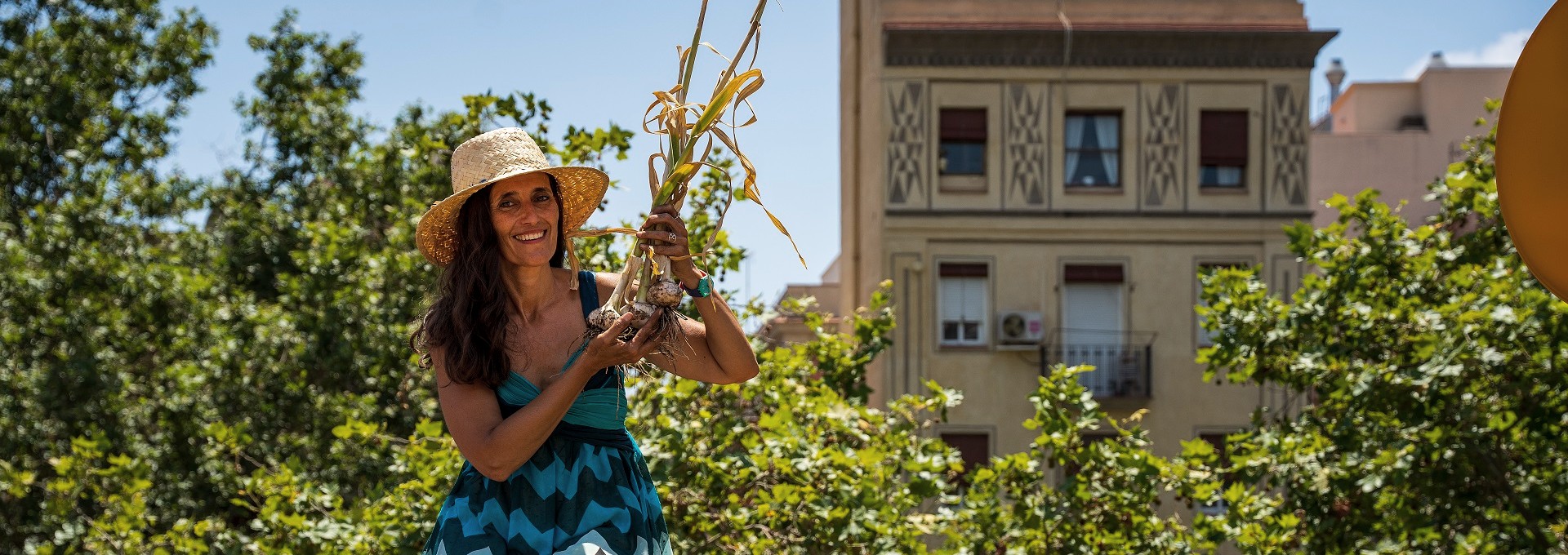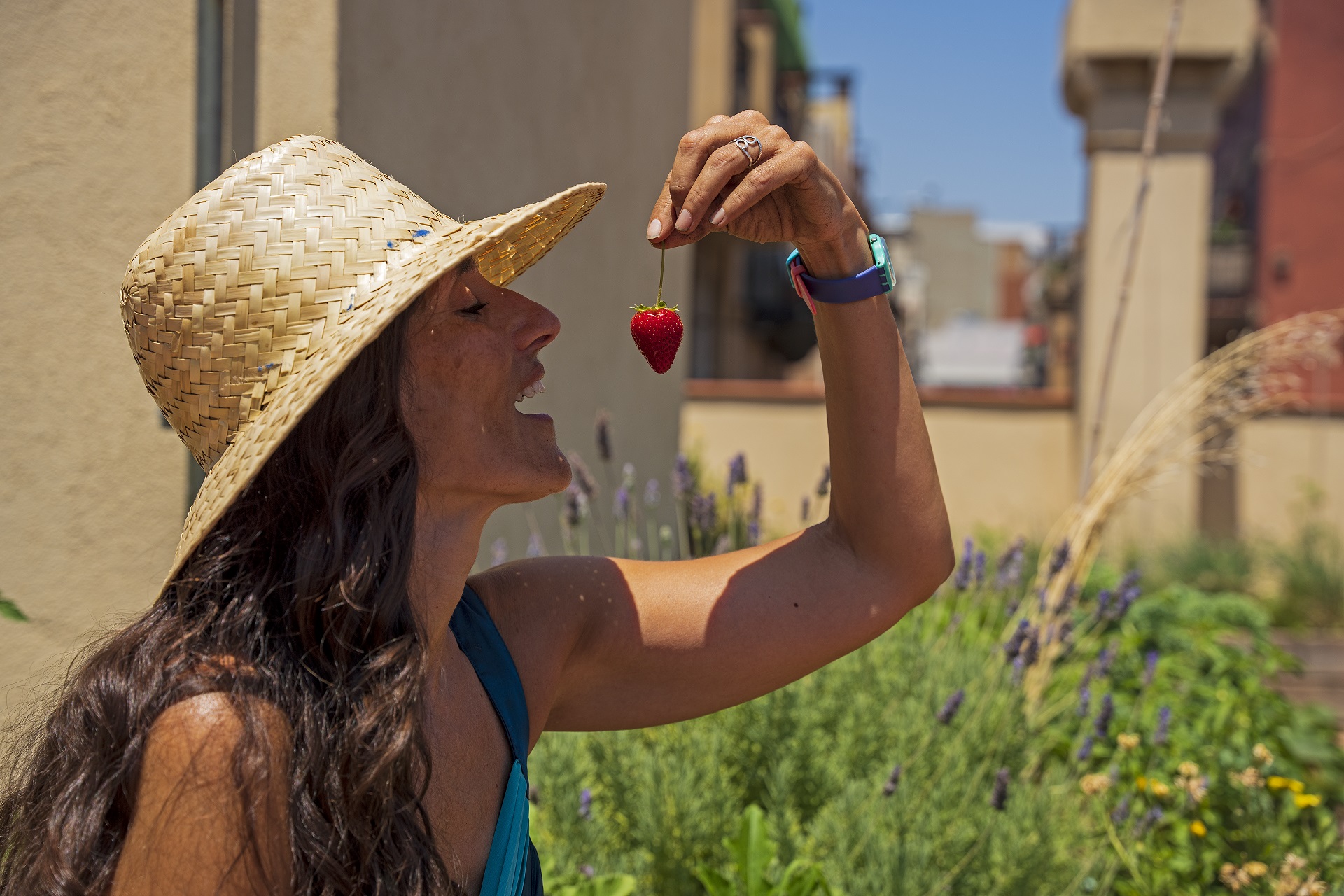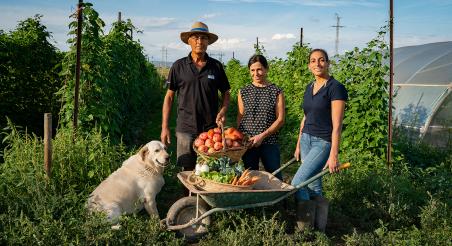Adela Martínez (Valladolid, 1975) started the Huertos in the Sky (Vegetable Gardens in the Sky) project in 2018 with the aim of revitalising the rooftops of the city of Barcelona, turning them into sustainable urban gardens. Adela is a telecommunications engineer who has dedicated almost her entire career to the world of technology. After living for 12 years in England, where she worked for several multinationals, she decided to move to Barcelona in 2012, settling in the Barceloneta neighbourhood, where she still lives today. She continues to work in the technology sector but now as a freelancer, which gives her the flexibility she needs to devote part of her life to breathing life into Barcelona’s rooftops and encouraging people to plant on them.
Her family comes from a village in León and they’ve always had a vegetable garden for growing their own food. What’s more, her grandfather was a shepherd. Despite all this, Adela had never shown interest in agriculture or livestock farming. She vaguely remembers helping out her grandparents with irrigation tasks and the sound of the water wheel that was used to draw water. Funnily enough, it was on the terrace of her rental apartment in Barcelona where she suddenly felt the need to have plants and grow food.
One day, Adela’s attention was drawn to the disused rooftops around her and she was surprised to discover that when you rent an apartment in the city, they don’t give you the key to the rooftop of the building, with the excuse of needing to protect television antennas and air conditioning units. She also observed the lack of green space per inhabitant in Barcelona: “Not including the Collserola Mountains, there are just 6 m2 of green space per person in Barcelona. If we include the mountains, there are 11 m2. The city’s densely populated and doesn’t have enough green space. When I realised that there were so many disused rooftops, I started researching the history of Barcelona. I discovered that neighbourhood communities used to celebrate the summer feast of Saint John’s Eve on rooftops, for example. They were also used as spaces for washing and drying clothes. These uses have faded out and almost no one goes up there anymore,” she explains.
«Barcelona is densely populated and doesn’t have enough green space» Adela Martínez
After compiling and analysing data, Adela concluded that around 70% of the city’s rooftops are flat and could be used for some sort of “green and beautiful” activity. She began researching initiatives implemented in other countries and came across the Brooklyn Grange rooftop farms in New York. “They started the project with a huge 4,000 m2 rooftop farm and now they run three of them. I thought that if they could do it there, we could do it here too, albeit on a smaller scale and in smaller spaces, because there are lots of rooftops with flat surfaces.”
Adela felt that the Poblenou neighbourhood would be ideal for setting up rooftop vegetable gardens, like the ones in Brooklyn. “But there was a problem: in the city of Barcelona, growing vegetables and selling what you grow is prohibited, since the land is classified as urban,” she laments. She decided to do something about it.
The birth of Huertos in the Sky
In 2018, Barcelona City Council launched a call to promote projects through a matchfunding campaign in collaboration with the Goteo platform and Barcelona Activa (the city’s local economic development agency). “They would match every euro you contributed. Without thinking twice, I submitted a project for creating an urban rooftop vegetable garden. I didn’t even have a name for it at first. Then, putting together an English word and a Spanish one, and associating the sky with a vegetable garden, Huertos in The Sky came to mind. It was a good combination with a personal connection.”
Adela achieved her funding goal and began to search for a space in which to cultivate her first vegetable garden. Finally, she found the rooftop where we conduct this interview. It belongs to the building next to hers and is located above a restaurant she discovered when she settled in the Barceloneta neighbourhood.
First she spoke to the restaurant owner, who gave her the contact details of the building’s owner. “Fortunately, he turned out be a very forward-thinking person. He doesn’t live there, but the property belonged to his grandparents. In fact, there’s a plaque at the entrance explaining that the building has been passed down from generation to generation. He thought it was a great idea, as long as the roof didn’t collapse!” she says, laughing. Adela pays him rent. It’s a small amount but enough for him to make a profit too.
The 155 m2 rooftop is home to a 47 m2 vegetable garden. It contains a wide variety of plants such as aromatic plants, marigolds, cabbages, lettuces, peppers, onions, carrots, strawberries, tomatoes, etc. Without a doubt, it’s the most colourful rooftop we can see at this height. “You can plant here and eat here too. We often forget that no matter how small the space is, you can always grow things there.”
«We often forget that no matter how small the space is, you can always grow things there» Adela Martínez
Adela explains that there are many methods for making the most of space, as she has proved. In the first year of the project, she managed to grow more than 300 kilos of vegetables on the rooftop, despite not using it intensively; that is, without using all the arable area. “It doesn’t mean you should stop shopping at supermarkets, local stores or markets. There are products you’ll still need to buy,” she says. “It’s important to be aware of what we buy, to know whether it’s seasonal, to consider where the food comes from and whether it’s possible to find a local farmer... What’s more, you start to attach greater importance to what you eat and where you buy it.”
Adela believes that if everyone had this awareness, they’d seek out local farmers, local vegetable basket distributors or cooperatives. “Lots of people go to the supermarket because it’s so convenient or because they may not know where to find alternatives. But, if you start getting organised, finding local food isn’t that complicated. Moreover, many farmers are striving to make shopping easier through online ordering, among other initiatives. That said, I think that once you start planting, there’s no turning back.”
Germinating knowledge
Driven by this growing passion, in 2021 Adela began mapping the collectives that promoted urban farming in Barcelona in various ways. She discovered a hydroponics project, which consists of the recirculation of water with nutrients, and the Green in Blue project, which has opened an aquaponics farm near Barcelona. “Fish fertilise the water which plants absorb through their roots. In these worrying times of drought, food production methods such as these are more important than ever,” she says. Together with these two projects, along with others related to green rooftops and landscaping, she submitted a proposal to the City Council to change the law that prohibits the sale of food grown on urban land, and created Replantem, an association made up of 23 founding partners with the aim of promoting urban farming and green initiatives.
During the first year of existence of Huertos in the Sky, Adela organised open days that attracted about 200 people. She’s happy to do her bit when it comes to contributing to other people’s knowledge. “Giving you the chance to put your hands in the soil and observe plant cycles is the greatest gift of Huertos in the Sky,” she says. Adela admits she didn’t know that a lettuce turned into a flower. She shares several anecdotes to illustrate how disconnected we are from what we eat. “I was once asked by some visitors where the carrots were. They didn’t realise that they grew underground; they thought they’d see them hanging here.” On another occasion, a five-year-old girl visited the vegetable garden with her parents and began picking strawberries and eating them. “Her mother told me that her daughter had never tried strawberries, even though she always put some on her plate. But when the little girl saw where they came from, she herself decided to eat some.”
«Giving you the chance to put your hands in the soil and observe plant cycles is the greatest gift of Huertos in the Sky» Adela Martínez
One of the difficulties of turning her activity with vegetable gardens into sustainable work is uncertainty. After four years working on the project, Adela can’t live off Huertos in the Sky. Being an entrepreneur and freelancer, and therefore no longer drawing a salary from a company, has generated a certain amount of financial instability. She currently combines her freelance work in the technology sector with the rooftop vegetable garden project. “I can’t devote myself solely to Huertos in the Sky and its related activities. But I keep going, accepting the uncertainty, even though I have constant doubts and consider throwing in the towel. I can see that I’d earn a good salary working for a company... I also wonder how I’ll be able to promote urban vegetable gardens in the event of a drought and water restrictions. But, of course, we also need greenery to make it rain more... In the end, something always happens that makes me see clearly the need to continue. Just coming up to this vegetable garden, observing it and taking care of it gives me the strength to carry on and keep contributing to making these things happen.”
This gardener not only works hard, but also continuously comes up with new ideas. Now, for example, she’s keen to turn the interior courtyards of the city blocks in Barcelona’s Eixample district into spaces for growing food. She feels that this initiative would be a great opportunity to raise awareness about what we eat and how we eat it. “Ildefons Cerdà wanted the city blocks to be used as gardens for residents’ associations, but many of them are roofs of private car parks and, moreover, it’s difficult to contact the owners. Of the 400 city blocks in Barcelona, only 70 have been recovered for use by Barcelona City Council,” she explains.
«Ildefons Cerdà wanted the city blocks to be used as gardens for residents’ associations, but many of them are roofs of private car parks and, moreover, it’s difficult to contact the owners» Adela Martínez
Connecting with nature
If Adela could share a skill with many people at the same time, it would be planting: “You have to plant a seed, water it, add some soil... People should be able to try it at home in small pots. There’s no need to have a large terrace; it can be done on a balcony. I think it’s essential to at least teach the basic techniques for growing our own food and storing seeds, just in case we need them one day.” She says that having a crop survival kit is just as important as having an emergency first aid kit.
Adela says that Barcelona stands out for the large number of schools with urban vegetable gardens, although they’re primary schools. She laments the fact that these gardens are seen only as an activity for children, the elderly and retirees. “When you move up to high school and university, all of that falls by the wayside and nobody grows anything,” she adds. She’s currently implementing Green Clubs for companies, with the goal of maintaining people’s interest in vegetable gardens. The procedure is simple: they build a vegetable garden on the roof of the company building with four or five growing tables and plant vegetables there. In addition, each month they organise workshops for Green Club members, where they plant and harvest crops. Workers show much more interest now when they visit the rooftop. “We give talks on nutrition, we invite experts along and we do some planting. In other words, we encourage everyone to get their hands dirty and learn something at the same time.”
On a personal level, her experience with Huertos in the Sky has allowed Adela to acquire deeper knowledge about the foods she eats, to better understand which fruits and vegetables are in season, and to become more aware of how the soil works and the importance of nourishing it properly. “They say that the microorganisms present in the soil resemble the intestines of plants, and that the soil biome is very similar to our intestinal biome. In fact, studies are being conducted on this relationship,” she explains.
One of things that Adela likes the most is the ability of plants to communicate with each other and how subterranean mycelia transmit information about neighbouring trees and plants. “If a tomato needs nutrients, it tells soil microorganisms that, in exchange for the sugar from photosynthesis that it provides, it would be good to receive some nitrogen and phosphorus, because it feels a little weak... So the microorganisms seek out nitrogen and phosphorus and supply them to the tomatoes through their roots. The ability of a seed to germinate, become a plant, flower, bear fruit, become a seed again and repeat this cycle over and over again is simply fascinating,” she concludes.
Every day, Adela visits the Barceloneta vegetable garden to carry out the necessary tasks, but also to enjoy this space of peace, meditation and creation. “There are times when I feel angry with the world. When I go up to the garden, all of that evaporates. How can you feel bad in this setting? Touching the soil is beneficial for mental, emotional and physical wellbeing, as researchers in therapeutic horticulture have demonstrated.”
«There are times when I feel angry with the world. When I go up to the garden, all of that evaporates. How can you feel bad in this setting?» Adela Martínez
For this urban farming enthusiast, Huertos in the Sky is more than just a horticulture project on the city’s rooftops: it’s an opportunity to connect with nature, learn about the cycle of life and discover the transformative power of plants. Her passion for healthy, sustainable eating is stronger than ever, and she aims to continue sharing this passion with others. Through her determination and enthusiasm, Adela inspires us to join the green revolution.
— BCN Smart Rural Editorial —




